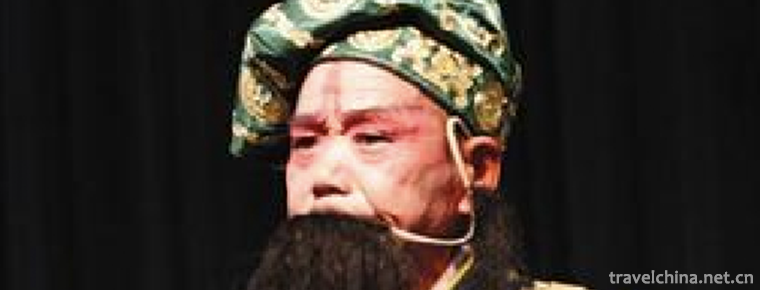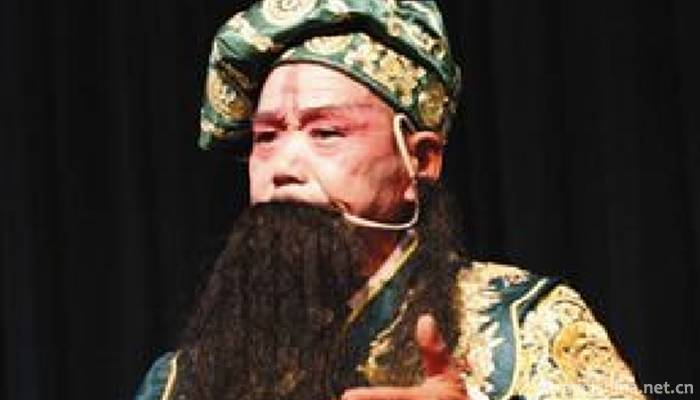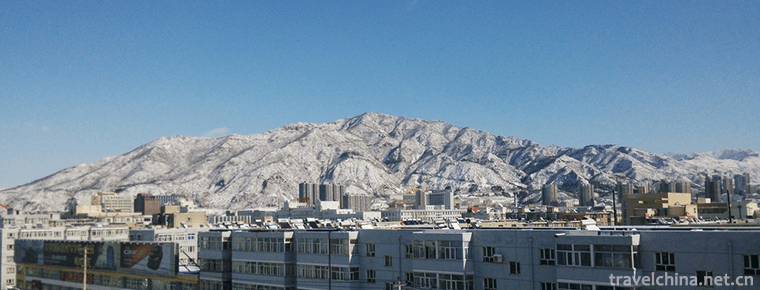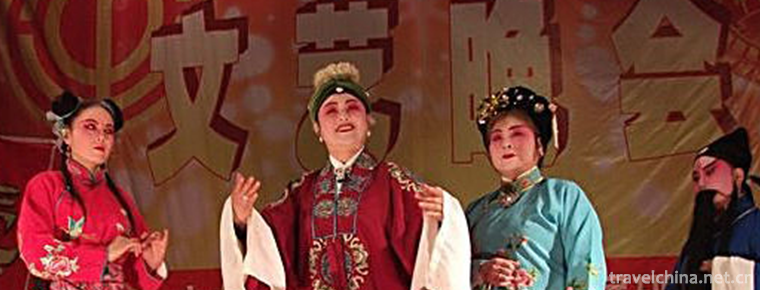2019-01-06

- By ChinaWiki.net
- Chinese Edition
- 2019-06-30
Wudang Shenju
Wudang Shenxi Opera is a kind of traditional opera in Xijiadian Town, Danjiangkou City, Hubei Province. It has a history of nearly 400 years since the Wang family absorbed Wudang culture and the music nutrition of local folk operas and folk tunes. The main singer of the major opera, Liantai opera, mainly historical stories, singing merits. At present, Wudang Shenju has excavated and sorted out more than 30 plays with 9 tunes and 24 tunes.
In May 2011, Wudang Shenxi, declared by Danjiangkou City, Hubei Province, was listed in the third batch of national intangible cultural heritage list with the approval of the State Council.
historical origin
Wudang Divine Opera, according to legend, Wang family loves opera from generation to generation, coupled with the family's wealth, has the basis of nurturing the theatre troupe. Around the 4th year of Qi Tomorrow (1624), Wang Mingfeng's three sons (Wang Yingtian, Wang Yingwu and Wang Yingbing) introduced the "tune opera" troupe, which became Wang's private troupe with abundant financial resources, and "tune opera" remained for generations.
Qingtang Village is one of the gathering and distributing places of pilgrims in North Shendao of Wudang Mountains, and also one of the logistic material bases for local materials of Wudang Taoist buildings. Later, he was selected as the "sacrificial drama" of Wudang Taoism. In the construction of temples, colored gods, wishes of large families, PILGRIMS'gatherings, and gang activities, all of them have to sing "sacrificial drama", which is the unique traditional opera sacrificial activity of Wudang Taoism since ancient times. Long-term sacrificial activities and theatrical performances have gradually incorporated the musical and cultural elements of Wudang Taoism.
Wang family loves opera for generations, and the family has a large production, which has the basis for nurturing the theatre troupe. Around the 4th year of Tianqi (1624) in the Ming Dynasty, Wang Mingfeng's three sons, Wang Yingtian, Wang Yingwu and Wang Yingbing, introduced the "tune opera" troupe, and synthesized the private troupe with the local opera Bachazi troupe, so that the tune opera and the Bachazi opera could coexist for a long time. The tune opera gradually evolved into a sacrificial drama serving the Taoist activities in Wudang Mountain, which melted Taoist music and cultural elements, and constantly absorbed the music nutrition of Bachazi opera and folk songs, making it evolve into Wudang God opera in Qingtang Village. In the Qing Dynasty, theatre troupes usually sang Bachazi Opera, which was mostly a minor drama of life, to make a scene. Then they sang more tunes of historical plays and local operas, which played a role of platform suppression. This custom spread to the early liberation period.
Qingtang Village is one of the main routes of Wudang Mountain's North Shinto, the temple property of Wudang Mountain's Taoism, the gathering and distributing center of pilgrims on the North Shinto, and one of the logistical material bases for local materials of Wudang Taoist architecture. Wudang Mountain Road always attaches great importance to Qingtang Village. With the approval of Wudang Taoism, "tune opera" was selected as the "sacrificial drama" of Wudang Mountain Taoism. In the construction of temples, colored gods, wishes of large families, PILGRIMS'gatherings and gang activities, we should sing "sacrificial drama". This is the unique opera sacrificial activity of Taoism in Wudang Mountain since ancient times. Long-term sacrificial activities and theatrical performances, "tune opera" gradually melted into the music and cultural elements of Wudang Taoism, and constantly absorbed the music nutrition of local folk operas and folk tunes, making it evolve into a unique "Wudang God opera" in Qingtang Village.
artistic characteristics
Wudang Shenxi Opera is a kind of drama in Hubei Province. It is well preserved in Qingtang Village, Xijiadian Town, Danjiangkou City. Mainly accompanied by gongs and drums, including two tunes (new tune, old tune) and five tunes (tight eight tunes, slow eight tunes, second-rate tune, pull-flower tune, selling Cuihua tune), musical instruments including gongs, drums, side drums, suona matching Sheng; the main repertoires are "Donglou Hui", "Send Friends", "White Fan Ji", "Four exhortations", "Liang Shanbo and Zhu Yingtai".
Inheritance Administration
Inheritor
Wang Derong, male, four groups of Qingtang Village, Xijiadian Town, Danjiangkou City, originated from Wudang Shenju, whose main roles are raw roles and inheritors of the 20th generation of Wudang Shenju. The representative plays are Baicaopo, Liang Shanbo and Zhu Yingtai, Zheng Deyun's Upper Sichuan.
Recent developments
Over the years, influenced by the times, it has been gradually abandoned or even replaced by various forms of modern art. Only more than ten old artists remain in the world. Because of the hard life and low salary, the younger generation has no intention to follow the art, and no one succeeds. In addition, the funds and facilities for rescuing the heritage are extremely short, and the drama is on the verge of extinction. In view of this, in April and May 2008, the Party Committee of Xijiadian Town invited national, provincial and municipal experts to hold a seminar on the survival and development of Wudang God's drama genre in this town. The town rescued and sorted out the drama genre, established and improved the archives of the successors, organized rehearsal performances, and made the drama genre protected and inherited. It also organizes specialists to dig, collate and protect all kinds of data, which lays a solid foundation for the theoretical research and inheritance of Wudang Shenju.
In 2009, we compiled and printed the "Qingtangcun Opera Collection" and declared it on the national intangible cultural heritage list. In 2010, the town built the Qingtang Performing Arts Complex Building and strengthened the construction of hardware facilities in Wudang Shenju area. Experts and scholars are invited to further demonstrate. In June 2011, Wudang Shenju successfully declared the list of national intangible cultural heritage. Successful application of the Shenxi opera not only effectively guarantees the inheritance of the Shenxi opera, but also plays a positive role in enhancing the cultural connotation of Danjiangkou, developing cultural tourism and enhancing its popularity.
Existing repertoire
There are more than 110 existing operas in Wudang Shen Opera, among which the tune operas are Shen Opera "Things in the Sky", "Han Xiangzi Huazhai". The local operas are "Nanqiao Hui", "Liu Hai Qiao Hui", "Yin Yang Error", "Fenshui River" and so on. The Bacha Opera includes "Delivering Fragrant Tea", "Four Advisements", "Zhang He Xiuwei" and "Donglou Hui". Now, before singing the original opera, they all begin with "God-worshipping opera" to show their devotion. The tune opera has rich singing tunes, with nine tunes and eighteen tunes, beautiful singing tunes, a hundred turns and a thousand turns, with strong local characteristics; Bachazi opera has five tunes, generally one lead singer, behind the scenes, people help each other to sing, with profound implications, making people associative and elegant.
Inheritance Significance
Wudang Shenju reflects the development of Wudang regional culture, the living conditions of the people and the course of social progress. It has significant historical reference value for the study of Taoist culture, the trajectory of opera development and the construction and development of Wudang Mountain. It has a certain value in theatrical research for the extensiveness of the content of opera, the diversity of tunes and the flexibility of expression.
"Wudang Divine Opera" is a kind of traditional opera that the Wang family of Qingtang Village, Xijiadian Town, Danjiangkou City, absorbed Wudang culture and music nutrition of local folk opera and folk song minor more than 400 years ago. Li Zhengkang, a member of the Chinese Association of Folk Literature and Art Artists and a librarian of mass culture research, and Li Xiangbin, an expert of civil culture research in Shiyan, finally came to the conclusion after nearly one year's textual research.
Since the excavation of Wudang Shenju in Qingtang Village in October 2007, although it has been actively protected by the local Party Committee and government, the historical origin of Wudang Shenju has not been able to "uphold itself". Wang Derong, one of the twentieth generation successors, said that Wang's ancestors were handed down orally from the end of Ming Dynasty and belonged to the family-inherited drama, while the local people said that the "outstanding people and the earth spirit" was the main reason for the birth of "Wudang Shenju". Why do many places in the script mention Wudang Mountain, and in the past, before singing "Wudang God Opera", we must first sing "God Opera", but also slaughter cocks, in order to show piety. People have questioned these two opinions. It seems that only by getting expert's conclusion can we distinguish the true from the false.

Ask a Question
Your email address will not be published.



0 Questions